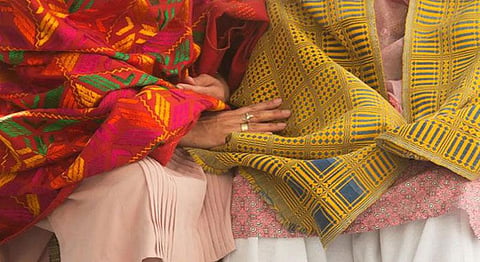
- HOMEGROWN WORLD
- #HGCREATORS
- #HGEXPLORE
- #HGVOICES
- #HGSHOP
- CAREERS
- ABOUT US
- CONTACT US

While cleaning out all the cupboards in my room the other day, like most people, I got consumed with rediscovering items more than the actual task at hand. Old photographs, a school uniform, a film camera and birthday cards from loved ones; it was a treasure trove of memories. At some point, I laid eyes on a folded piece of fabric that did not belong to me. Intrigued by the embroidery, I was soon told that it was a Phulkari (textile) made by my dadi (grandmother) and gifted to my mother during her wedding back in 1997.
Phulkari embroidery is a domestic art that has transcended the ordinary; becoming a generational heirloom. In the era of machine-made textile, phulkari holds an eternal relevance that sheds a bright light on hand-made crafts. The traditional craft traditionally utilizes floral work but plays with geometrical motifs and shapes as well. The textile has deep ties with the daughters of Punjab and is a personal gift embroidered at birth by mothers and grandmothers or gifted during nuptial ceremonies. The earliest mention of the word phulkari can be found in the love story Heer-Ranjha, written by Warris Shah, describing the embroidery on outfits worn by Heer.
It is the perfect representation of the creativity harboured by women in small and big homes all around the state. A single piece takes about six to twelve months to complete and involves intricate, painstaking needlework. Phulkaris revealed information about the artist as well. While a pair of peacocks described their relationship with their spouse, a blooming plumage represented marital bliss. The process of learning this skill also strengthened the bonds between women of different generations. Phulkari embroidery was an everyday activity for the Hindu, Muslim, and Sikh women of Punjab. There were about twelve types of phulkaris, with each having a special occasion and reason to be worn.
‘Vari Da Bagh’ is a form of phulkari gifted by a bride’s mother-in-law when she enters a new household, becoming a basis for the relationships between women and enabling them to grow and carry the skill to another generation. Similar to the phulkari created by my grandmother, these heirlooms outlive the creators while embodying a love that transcends human life.
The book ‘Remnants of a Separation’, written by Aanchal Malhotra, mentions a conversation with a woman named Hansala Chowdhary who describes the message of phulkari gifted to brides.
“Life is long, my child, a stitch would lovingly be placed into the cloth, but I am with you every step of the way. Here this is my love, a stitch, this is my compassion, another stitch, here is my patience, my diligence, my dedication. And this, the several threads that bound the base fabric together, this is your union with your husband…”
— Remnants of a Separation (2017)
There is a personal history attached to each piece which can be traced back to the artist, their story, and their struggles. The Lost Graduation Show featured a project by Rashi Sharma that seeks the preservation of historical and cultural assets shared between India and Pakistan and focuses on narrating stories of migration using a form of phulkari called ‘Sainchi’.
Although the art of embroidery is getting lost in recent years, the craft remains the main source of income for rural women in Punjab. Instead of becoming a cultural relic, phulkari is now a source of empowerment; helping women earn financial freedom, providing a livelihood, and greatly benefiting the rural economy.
Like phulkari, there are so many cultural heirlooms that offer deep insight into our family history. They offer snippets of memories that we never lived through. So open that ‘ancient’ cupboard and look through the drawers and unopened boxes. It will be a scavenger hunt that could very well lead you to unheard stories of love and belonging.
If you enjoyed reading this, we also suggest:
